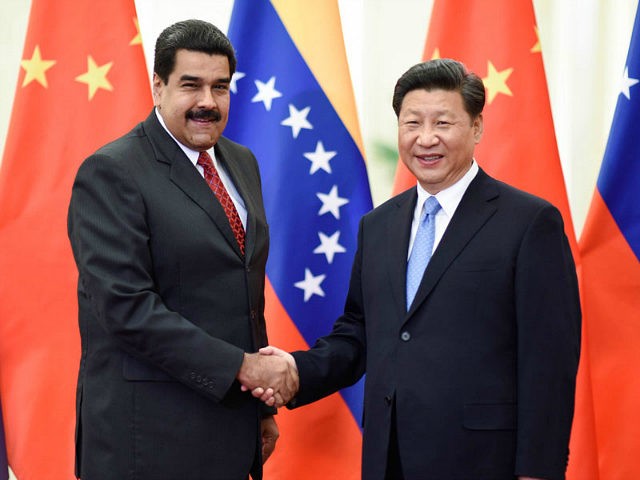Chinese authorities detained a Twitter user for blaming Communist Party leader Xi Jinping for ‘exporting the evils of communism’ to Venezuela, a report from Radio Free Asia (RFA) revealed Tuesday.
China has officially banned Twitter in the country, but many citizens use various technological advances to circumvent the ban, and the Chinese government has repeatedly bullied those on Twitter, Chinese or otherwise, to censor themselves or face repercussions from Beijing.
RFA identifies a Twitter user named Zhao Weidong as the victim of a temporary detention for retweeting a post criticizing Maduro and China’s role in keeping him in power by providing political and financial support.
“How did Venezuela go from being the richest democracy in the world to a totalitarian socialist state?” read the tweet from the U.S.-based account @brother_chui. “Well, we have [Chinese president Xi Jinping] to thank for that, for exporting the evils of communism to the whole world!”
Police forced him to pay a 500-yuan fine on January 29 for sharing “false information,” according to RFA.
The fine led to others running afoul of the Chinese regime by defending Zhao, such as Wu Bin, a user RFA describes as a “free speech activist.”
“The state security police told me to delete the tweet [in favor of Zhao], so I deleted it,” he said. “It’s ridiculous; now you don’t just get fined for criticizing our own [government], you can get fined for criticizing a foreign country, too.”
“Our relationship with Venezuela is too cozy by far, to the extent that they have to dig the knife in on behalf of our so-called friend,” he continued. “There is no freedom of expression in this country, nor any sense of safety.”
China enjoys a close relationship with the Maduro regime, having provided multiple loans and credit lines in exchange for access to its valuable oil industry. However, many believe officials in Beijing feel sensitive to the impact of Venezuela’s humanitarian crisis on their reputation, as the two regimes share similar values of authoritarianism and revolutionary socialism.
“The incident involving Zhao Su from Xi’an … shows that the Chinese Communist regime’s so-called self-confidence is actually non-existent,” wrote on Twitter user, named Wang. “They are in a state of high alert because of the changes in the political situation in Venezuela.”
Pressure on the Maduro regime has escalated significantly over the past month after interim President Juan Guaidó was inaugurated the nation’s head of state. Maduro has refused to acknowledge Guaidó’s constitutionally mandated power or step down. Beijing has so far avoided expressing explicit support to Maduro but did demand that the U.S. drop its efforts to intervene on the crisis.
“We have been closely following the current situation in Venezuela and call upon all relevant parties to stay rational and cool-headed and seek a political solution to the issue of Venezuela through peaceful dialogue within the framework of the Venezuelan Constitution,” Chinese Foreign Ministry spokeswoman Hua Chunying said last month.
“China supports the efforts made by the Venezuelan government to uphold national sovereignty, independence, and stability. China always upholds the principle of non-interference in other counties’ internal affairs and opposes foreign interference in Venezuela’s affairs,” she continued.
This month, Guaidó urged China to drop its tacit support for Maduro, saying that relations would improve if Venezuela underwent a democratic transition.
“What most suits Russia and China is the country’s stability and a change of government,” he told Reuters. “Maduro does not protect Venezuela, he doesn’t protect anyone’s investments, and he is not a good deal for those countries.”
Follow Ben Kew on Facebook, Twitter at @ben_kew, or email him at bkew@breitbart.com.

COMMENTS
Please let us know if you're having issues with commenting.